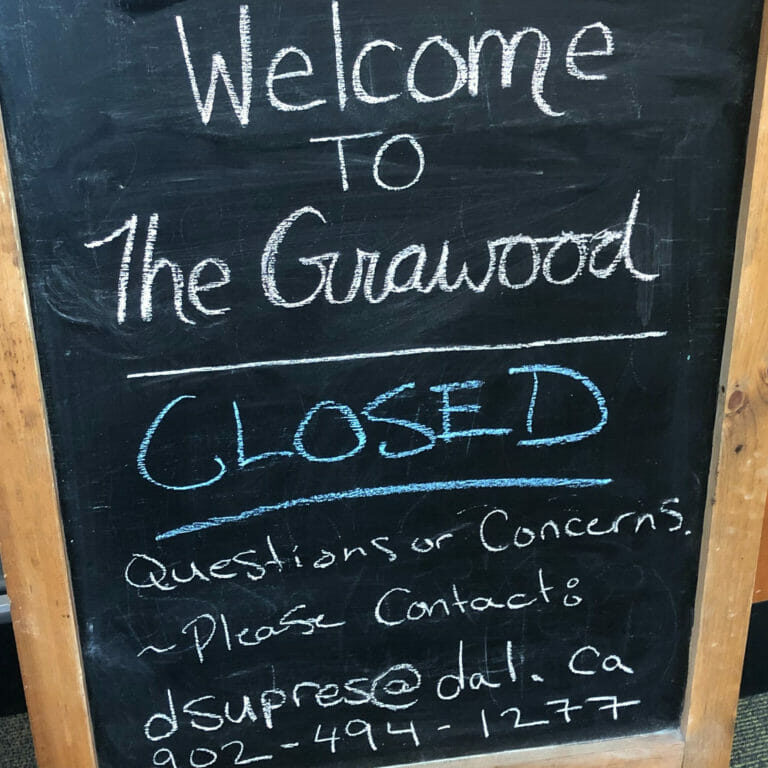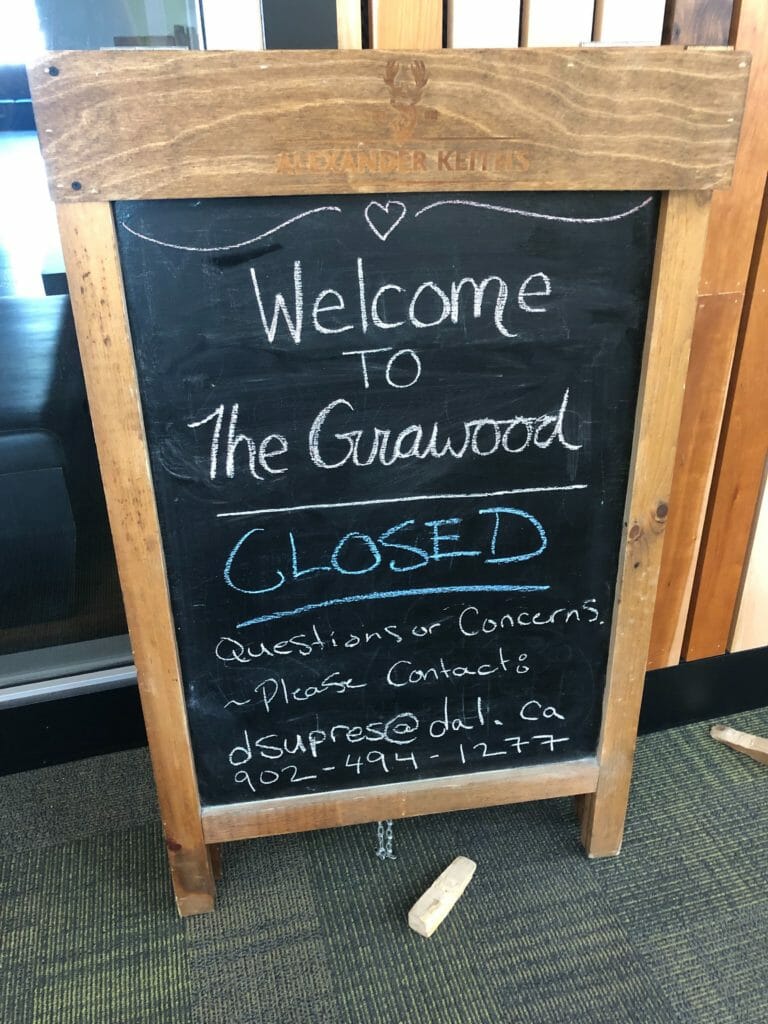
DSU mum on details of staff restructuring
Focus on prospective membership with the CFS
This summer, the Dalhousie Student Union (DSU) received backlash after its “employment restructuring” lead to firings of full-time staff. The executive are now preparing to deliver on campaign promises for their one year term.
On May 28, the DSU announced a prospective membership with the Canadian Federation of Students (CFS). A few weeks later, they fired two full-time employees of 15 and 20 years respectively, resulting in an immediate closure of Studley Campus bar The Grawood, and Sexton Campus bar the T-Room (without a notice to their employees, according to the Grawood’s Facebook page). They also created two new full time positions through the firings, a director of Operations and director of Research and Outreach.

In June, the Chronicle Herald reported that the DSU full-time staff were aware that sudden terminations could take place and were seeking the security of the United Food and Commercial Workers, a labour union.
The firings
According to a DSU FAQ sheet released on Aug. 8, the decisions to fire Greg Wright, the director of Licensed Operations since December of 2003 and Craig Kennedy, the executive director since February of 1999, were made at a council meeting on June 19.
DSU President Aisha Abawajy declined to comment on the matter. “I cannot speak on any HR matters, as the privacy of our employees and their confidentiality is very important to us,” she said.
On June 20, the Facebook accounts for both the Grawood and the T-Room uploaded identical posts announcing that due to unforeseen circumstances they would be closing indefinitely and directed all questions to the President of the DSU.
According to an anonymous DSU source quoted in Global News, the closures were a direct result of the firing of Greg Wright. The employees were unaware the closures would take place.
“I called to make a reservation for 15 people on the 19th for the June 21st. They should have told me no, instead of taking the reservation,” said one commenter on Facebook. The Grawood’s account replied: “We are so sorry! We did not know this would happen and had no heads up.”
The Grawood resumed regular summer hours on August 19 and no announcement has been made about the T-Room’s reopening so far.
According to the DSU’s FAQ sheet, the closure did not affect the employees of the Grawood or the T-Room. The document also said that all staff were paid for shifts they would have had during the closure and were consulted on their tip earnings and subsequently reimbursed.
New positions
Aisha Abawajy said the new positions created after the firings, director of Operations and director of Research and Outreach, will benefit students.
The director of Research and Outreach will be “working on research to be able to bring data together in terms of what policies can look like that the DSU develops […] how do we take information from students on the ground and filter it up into campaigns that are actually talking on issues students wants to be the focus.”
The director of Operations will focus on “overhead management, doing all the logistical things that need to be done in order to run an organization such as ours,” said Abawajy.
Craig Kennedy, who did not respond to an interview request from the Dalhousie Gazette, described his former position with the DSU on his LinkedIn profile as being “responsible for the overall management of services, programs and facilities. Responsible for 13 full-time and 125 part-time staff and a +$7 million budget.”
Concerns about job security
Wally Cuvelier, a member of the Eastern Province’s Council of the United Commercial Food and Workers, said he was approached by 12 members of the DSU staff, prior to the firings of Greg Wright and Craig Kennedy. He would not reveal which staff members approached him, nor confirm if Wright or Kennedy were among them.
“A group of employees approached me and after I filed for an application, that’s when those two individuals were terminated,” he said.
The employees, Cuvelier said, approached him with simple concerns. “As you know, the [executive] changes every year. So you’ve got a new direction almost every year. And, you know, I guess it comes to a point where they’re like: ‘hold it now we need a voice here, we need some protection.’”
Abawajy said the DSU supports the prospect of employees unionizing.
“We, as the DSU, do support the decision of our employers to seek representation as they choose to. The power in numbers can achieve rights for all. And we are very excited to work with all of our staff members to create an inclusive social justice centric workspace.”
However, as of current state (Aug. 20), the unionizing process has been delayed by the DSU.
“We’re still in the throes of the application,” said Cuvelier. He added that there is debate over the matter of “who’s in the bargaining unit” and “who’s not.”
According to Cuvelier, the DSU is attempting to keep four of the 12 staff members out of the bargaining unit, claiming they hold managerial positions and therefore should not be included.
“Most employers want less people in the bargaining unit,” said Cuvelier. “In this case, they’re saying that those four had true managerial duties. And I don’t believe the four of them do. You know, there may be an individual – not really sure. But it certainly can’t be four.”
In response, Abawajy said that in accordance with the Trade Union Act, employees who hold managerial roles or know confidential information regarding labour relations should be excluded.
“The DSU does not object to the formation of the union but to ensure that our union is able to operate to the best of its abilities we have to put forward the exclusions.”
In an attempt to reach a decision on who should be included in the agreement, the Nova Scotia Labour Board has conducted interviews with the employees to determine the true position of each. If each side, the UFCW and the DSU, approve the Labour Board’s designations, they will count a vote. If an agreement cannot be reached then both parties will proceed to a hearing, in which they will argue who they believe should be included in the bargaining agreement.
Correlation with the prospective CFS membership
Former DSU communications and outreach coordinator Paul Whyte, who did not respond to an interview request from the Dalhousie Gazette, was quoted in Global News saying “when a new union enters into the Canadian Federation of Students, there’s almost this cleaning of house that happens where the old staff who have been there 20-plus years, they’re rather swiftly terminated.”
Whyte also said that through entering a prospective membership with the CFS, the DSU is violating their own by-laws. The by-law in question (12.1) is one “that governs membership in external student organizations specifies cases where fees are attached to the membership,” reads the DSU’s August 8 FAQ sheet.
The CFS has waived any prospective membership fees for the DSU. Lianne Xiao, the chairperson for Nova Scotia’s branch of CFS, said this is common practice. “There is a 5 per cent fee that has been historically waived by the National Executive.”
According to its website, the CFS is a non-partisan organization that advocates for over 500,000 domestic and international, college, undergraduate and graduate students across Canada. They run a number of campaigns to fight for student issues, such as Fight the Fees and Fairness for International Students campaigns.
Xiao said a prospective membership will benefit the DSU and its members, especially during an election year. “The campaign that we’ve launched this year, the Time to Be Bold campaign, is surrounding the federal election and I’m actually really excited to see what Dalhousie students want to make a student issue and an election issue this year.”
While Xiao is excited for the work the DSU and CFS will do together, they emphasized that the CFS does not interfere with governing decisions of the DSU.
“The DSU is an independent student organization. We are not responsible for the internal events that happened.”






